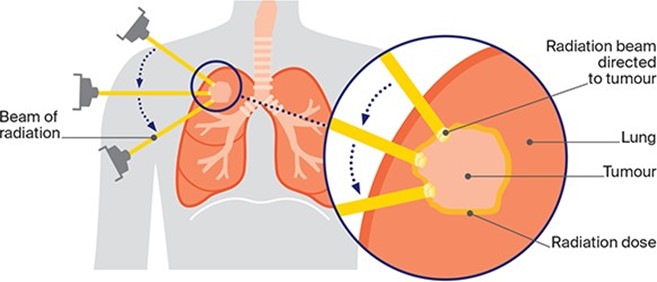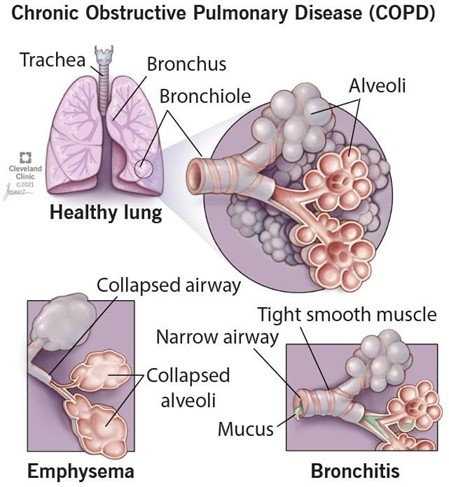A nurse is caring for a client who is receiving radiation therapy to treat lung cancer. Which of the following actions should the nurse take?
Observe for signs of infection
Examine the skin for generalized urticaria
Review laboratory test results for low hemoglobin
Monitor the mouth for signs of xerostomia
The Correct Answer is A
Radiation therapy can cause immunosuppression, which increases the risk of infection. The nurse should monitor the client for signs of infection such as fever, chills, malaise, or purulent drainage.
- Examine the skin for generalized urticaria. This is not a common side effect of radiation therapy, as urticaria is an allergic reaction that causes hives or welts on the skin. Radiation therapy can cause localized skin irritation, erythema, or dryness, but not generalized urticaria.
- Review laboratory test results for low hemoglobin. This is not a direct effect of radiation therapy, as hemoglobin is a component of red blood cells that carries oxygen in the blood. Radiation therapy can cause anemia, which is a low number of red blood cells, but not necessarily low hemoglobin.
- Monitor the mouth for signs of xerostomia. This is not relevant for a client who receives radiation therapy to treat lung cancer, as xerostomia is dry mouth caused by reduced salivary gland function. This can occur in clients who receive radiation therapy to treat head and neck cancer, but not lung cancer.

Nursing Test Bank
Naxlex Comprehensive Predictor Exams
Related Questions
Correct Answer is B
Explanation
Pursed-lip breathing is a technique that helps clients with COPD to exhale more effectively and prevent air trapping in the lungs. It also reduces dyspnea and improves oxygenation.
a) A low protein diet is not recommended for clients with COPD, as they need adequate protein intake to maintain muscle mass and prevent malnutrition.
c) Fluid restriction is not necessary for clients with COPD, unless they have signs of fluid overload or heart failure. Adequate hydration helps to thin secretions and facilitate expectoration.
d) Early-morning hours are not the best time for exercise and activity for clients with COPD, as they may experience more shortness of breath and fatigue due to diurnal variations in lung function. A better time would be mid-morning or afternoon, after taking bronchodilators and clearing secretions.

Correct Answer is ["A","B","D"]
Explanation
Answer: A, B D
Rationale:
-
Albuterol is a bronchodilator, and one of its key effects is to relax the muscles around the airways, which helps prevent wheezing. Wheezing is often caused by narrowed airways, and by opening them, albuterol helps to prevent this sound, which is associated with asthma or other respiratory conditions.
-
B. The medication will decrease coughing episodes:
Albuterol can help decrease coughing in individuals with conditions like asthma or chronic obstructive pulmonary disease (COPD) by relaxing the muscles in the airways, which reduces airway constriction. Since coughing often occurs due to airway obstruction, albuterol’s bronchodilator effect can help alleviate this symptom. -
C. The medication will reduce inflammation: Albuterol does not have anti-inflammatory properties. Its primary mechanism is bronchodilation, and anti-inflammatory treatment generally requires corticosteroids, not beta-agonists like albuterol.
-
D. The medication will open the airways:
This is correct. Albuterol works as a bronchodilator, meaning it opens up the airways by relaxing the smooth muscles surrounding them. This improves airflow and makes breathing easier, which is why it is often used in conditions like asthma or COPD. -
E. The medication will stimulate flow of mucus: Albuterol does not stimulate mucus production; it primarily works by relaxing the airways. However, by improving airflow, it can help clients more effectively expel mucus through coughing.
Whether you are a student looking to ace your exams or a practicing nurse seeking to enhance your expertise , our nursing education contents will empower you with the confidence and competence to make a difference in the lives of patients and become a respected leader in the healthcare field.
Visit Naxlex, invest in your future and unlock endless possibilities with our unparalleled nursing education contents today
Report Wrong Answer on the Current Question
Do you disagree with the answer? If yes, what is your expected answer? Explain.
Kindly be descriptive with the issue you are facing.
